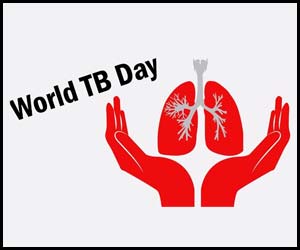- Home
- Editorial
- News
- Practice Guidelines
- Anesthesiology Guidelines
- Cancer Guidelines
- Cardiac Sciences Guidelines
- Critical Care Guidelines
- Dentistry Guidelines
- Dermatology Guidelines
- Diabetes and Endo Guidelines
- Diagnostics Guidelines
- ENT Guidelines
- Featured Practice Guidelines
- Gastroenterology Guidelines
- Geriatrics Guidelines
- Medicine Guidelines
- Nephrology Guidelines
- Neurosciences Guidelines
- Obs and Gynae Guidelines
- Ophthalmology Guidelines
- Orthopaedics Guidelines
- Paediatrics Guidelines
- Psychiatry Guidelines
- Pulmonology Guidelines
- Radiology Guidelines
- Surgery Guidelines
- Urology Guidelines
World Tuberculosis Day- Dr Latha Sharma

Tuberculosis (TB) is a disease caused by bacteria called Mycobacterium tuberculosis. It usually affects the lungs, but can also affect other parts of the body, such as lymph node, intestines, brain, kidney, spine.
What are the symptoms of TB?
Symptoms of TB disease include a feeling of sickness or weakness, weight loss, fever, and night sweats. TB of lungs may show up as cough, sputum production, chest pain, and the coughing up of blood. Features of TB in other parts of the body depend on the area affected.
How is TB spread?
TB bacteria are released into the air when a person with TB of the lungs or throat coughs or sneezes. These bacteria can stay in the air for several hours. Persons in close contact, who breathe in the air containing these TB bacteria can become infected.
Persons with TB disease are most likely to spread the bacteria to other people they spend time with every day, such as family members or co-workers. Anyone who has been in close contact with TB patients should consult doctor or local health department for TB tests. Myths about TB spreading by sharing utensils, touching should not be entertained.
Can TB be treated?
Once TB is diagnosed, it is very important that medicines are taken strictly, without missing, as advised by doctor. If drugs are stopped before completing full course, there is risk of recurrence of TB, with more virulent bacilli which may be difficult to treat. Treatment should be continued for at least six months.
Not everyone infected with TB germs becomes sick. Those at high risk for developing TB include:
- People with HIV infection
- People who became infected with TB bacteria in the last 2 years
- Babies and young children
- People who inject illegal drugs
- People who are sick with other diseases that weaken the immune system
- Elderly people
It is important to identify the disease in early stages as excellent results can be achieved when treated early. Sputum examination, chest X-ray are the most important tests for diagnosing TB in lungs. TB in areas other than lungs may be difficult to confirm as taking samples from areas like spine, abdomen, brain, bone need expertise and facilities may not be available in all centres. Strong suspicion along with clinical features helps the doctor in deciding whether to start TB
treatment.
Dr Latha Sharma, Consultant Pulmonologist, KIMS Hospitals, Secunderabad.

Disclaimer: This site is primarily intended for healthcare professionals. Any content/information on this website does not replace the advice of medical and/or health professionals and should not be construed as medical/diagnostic advice/endorsement or prescription. Use of this site is subject to our terms of use, privacy policy, advertisement policy. © 2020 Minerva Medical Treatment Pvt Ltd